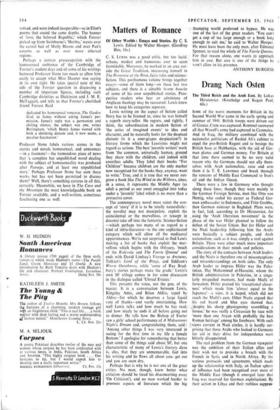Matters of Romance
Of Other Worlds : Essays and Stories. By C. S. Lewis. Edited by Walter Hooper. (Geoffrey Bles, 16s.) C. S. LEWIS was a good critic, but too lucid, urbane, modest and humorous ever to seem formidable. Moreover, he worked in an area out- side the Great Tradition, interesting himself in The Romance of the Rose, fairy-tales and science- fiction. This posthumous volume brings together essays—some of them long—on these last two subjects, and there is a sizeable bonne bouche of some of his own unpublished stories. Pros- pective readers who fear an admixture of Anglican theology may be reassured; Lewis knew how to keep his categories separate.
Lewis writing on the aspect of fiction called Story has to be listened to, since he was himself a superb story-teller. He regrets, and rightly, I think, the subordination in modern fiction of 'the series of imagined events' to idea and character, and he naturally looks for the despised element (is it a sour-grapes despication?) in literary forms which the Leavisites might not regard as serious. The best 'juvenile writers' work from 'the common, universally human, ground they share with the children, and indeed with countless adults. They label their books "For Children" because children are the only market now recognised for the books they, anyway, want to write.' True, and it is true that we never out- grow a book like The Wind in the Willows, since, in a sense, it represents the Middle Ages (as adult a period as our own) smuggled into today under a 'juvenile' label which is no more than a protective cover.
The contemporary novel must reject the con- cept of 'story' if it is to be totally naturalistic: the novelist may not manipulate, exploit the coincidental or the marvellous, or (except in dreams) take off into the fantastic. Science-fiction —which perhaps too many of us regard as a kind of infra-literature—is the one sophisticated category which will allow all the mediaeval appurtenances. We're not surprised to find Lewis making a list of books that exploit the mar- vellous which begins with the Odyssey, 'much of the Kalevala and The Faerie Queene' and ends with David Lindsay's Voyage to Arcturus, Tolkien's Lord of the Rings, and Eddison's Worn Ouroboros, while `some of Ray Brad- bury's stories perhaps make the grade.' Lewis's own SF trilogy comes in for some discussion in the dialogue called 'Unreal Estates.'
This presents the voice, not the pen, of the master. It is a conversation between Lewis, Kingsley Amis, and Brian Aldiss, taped by Aldiss—for which he deserves a large liquid vote of thanks—and vastly entertaining. How well Lewis talks and how much he has read, and how nicely he ends it all before going out to dinner. He tells how the Bishop of Exeter saw a girls' school performance of A Midsummer Night's Dream and, congratulating them, said : 'Among other things I was very interested in seeing for the first time in my life a female Bottom.' I apologise for remembering that better than some of the things said about SF, but one characteristic of many of Lewis's literary dicta is, alas, that they are unmemorable. Get into his writing and he flows all about you; get out and you are soon dry.
Perhaps that is why he is not one of the great critics. No man, though, knew better what criticism should be (read his disconcerting essay 'On Criticism'), and no man worked harder to promote aspects of literature which the big thumping world preferred to bypass. He was one of the last of the great readers. 'You can't get a cup of tea large enough or a book long enough to suit me,' he said to Walter Hooper. He must have been the only man, after Edmund Spenser, to read the whole of The Faerie Queene. For that reason alone, one wants ,to approach him in awe. But awe is one of the things he won't allow in his presence.
ANTHONY BURGESS


































 Previous page
Previous page